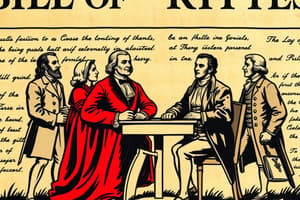Podcast
Questions and Answers
The ______ favored a strong centralized government during the Constitutional Convention of 1787.
The ______ favored a strong centralized government during the Constitutional Convention of 1787.
Federalists
Anti-Federalists feared that a strong central government would weaken state and local ______.
Anti-Federalists feared that a strong central government would weaken state and local ______.
governments
James Madison proposed a separation of powers in ______ No. 10 to prevent any group from becoming too dominant.
James Madison proposed a separation of powers in ______ No. 10 to prevent any group from becoming too dominant.
Federalist
The Great Compromise established a ______ legislature to balance power between the national and state governments.
The Great Compromise established a ______ legislature to balance power between the national and state governments.
Anti-Federalists strongly advocated for a ______ of Rights to protect individual freedoms.
Anti-Federalists strongly advocated for a ______ of Rights to protect individual freedoms.
The Federalists believed a national government with more power would strengthen relationships between ______.
The Federalists believed a national government with more power would strengthen relationships between ______.
______, including Patrick Henry, opposed a powerful national government, fearing it would resemble a monarchy.
______, including Patrick Henry, opposed a powerful national government, fearing it would resemble a monarchy.
The ______ Rebellion highlighted weaknesses in the Articles of Confederation, prompting calls for a stronger government.
The ______ Rebellion highlighted weaknesses in the Articles of Confederation, prompting calls for a stronger government.
Flashcards
Federalism
Federalism
Advocates for a strong central government with significant power, emphasizing national unity and efficiency.
Anti-Federalism
Anti-Federalism
Opposes a powerful national government, favoring strong state sovereignty and individual liberties.
Federalism - Balance of Power
Federalism - Balance of Power
Ensures that power is distributed between the national and state governments, preventing one from becoming too dominant.
Bill of Rights
Bill of Rights
Signup and view all the flashcards
Separation of Powers - James Madison
Separation of Powers - James Madison
Signup and view all the flashcards
Bicameral Legislature
Bicameral Legislature
Signup and view all the flashcards
Shay's Rebellion
Shay's Rebellion
Signup and view all the flashcards
Whiskey Rebellion
Whiskey Rebellion
Signup and view all the flashcards
Study Notes
Federalism and Anti-Federalism in the US Constitution
- Mixed messaging from the White House during the COVID-19 pandemic and President Trump's claims of "total authority" are discussed.
- Two contrasting viewpoints, Federalism and Anti-Federalism, emerged during the Constitutional Convention of 1787.
- Federalists, including Alexander Hamilton, John Adams, George Washington, and James Madison, favored a strong central government, believing a powerful national government would strengthen interstate relations and uphold individual liberties.
- Federalists highlighted the need for a stronger government to counter issues like Shay's Rebellion and Whiskey Rebellion, which exposed weaknesses in the Articles of Confederation.
- Federalists argued a strong central government would prevent factions from dominating the system and imposing their will.
- James Madison, in Federalist No. 10, proposed a separation of powers to prevent any single faction from becoming too powerful.
- Federalists acknowledged state sovereignty, stipulating that powers not given to the federal government were reserved for states and their citizens.
- Anti-Federalists, including Patrick Henry, George Mason, and Richard Henry Lee, opposed a powerful national government, fearing it resembled the monarchy they had overthrown.
- Anti-Federalists believed a strong central government would diminish state and local governments, reducing citizen participation.
- Anti-Federalists advocated for the decentralized power structure of the Articles of Confederation, emphasizing states' rights and self-governance.
- Anti-Federalists asserted that a strong central government would infringe on individual liberties.
- Anti-Federalists pushed for a Bill of Rights to protect individual freedoms and limit the national government's authority.
- The Great Compromise, proposed by Roger Sherman, balanced the interests of Federalists and Anti-Federalists.
- It established a bicameral legislature--the House of Representatives (representation based on population) and the Senate (equal representation per state).
- The executive branch, headed by the President, is subject to checks and balances from the legislative and judicial branches to prevent overreach.
- The Bill of Rights, including the Tenth Amendment, is a direct outcome of Anti-Federalist concerns.
- The Tenth Amendment designates powers not explicitly given to the federal government as reserved for the states and their citizens.
- This amendment directly contradicts President Trump's claims of "total authority" by highlighting the balance of power between national and state governments.
Studying That Suits You
Use AI to generate personalized quizzes and flashcards to suit your learning preferences.
Description
Explore the fundamental debate between Federalists and Anti-Federalists during the Constitutional Convention of 1787. This quiz delves into the arguments for a strong centralized government and the concerns over individual liberties, highlighting key figures like Madison, Hamilton, and Washington. Test your knowledge on how these debates shaped American governance.



